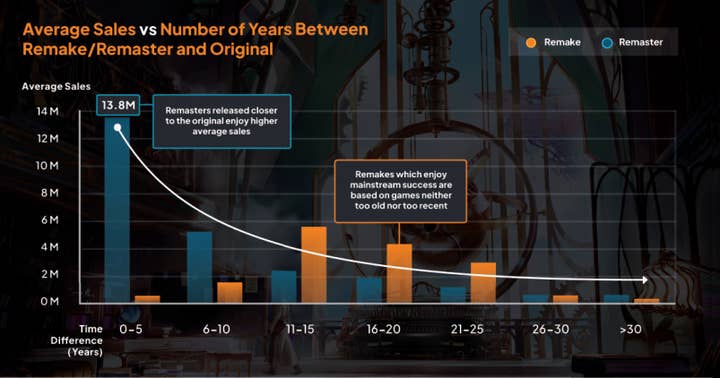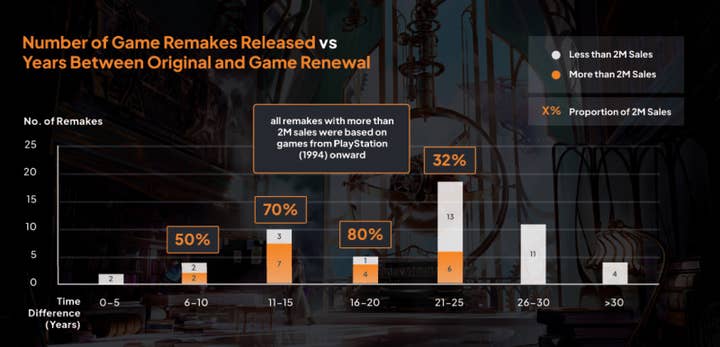Best time to remake a video game? Between 10 and 20 years later
New study also reveals that remasters perform best when the game is under 5 years old
The best time to remake a video game is when it's between 11 and 20 years old, according to data from IDG Consulting and Strategic Game Consulting.
The data comes from a White Paper discussing the opportunities and challenges associated with remasters and remakes, and it looked at over 200 remakes and remasters released since 2012 and how well they sold. In terms of remakes, games released between 11 and 15 years after their original performed best, followed shortly by games released between 16 and 20 years ago.
Out of the remakes released between 11 and 15 years ago after their initial release, 70% of them have gone on to sell over two million copies, while that number rises to 80% for games based on 16 to 20-year-old titles. By contrast, just 32% of remakes from games 21 to 25 years old have reached two million units.

"Remakes find success when key hardware and software developments allow meaningful additions and resolution of pain points in the original games," the report stated.
"Historically, developers have preferred to remake games over a decade old, with only 4% of remakes in our dataset having a time gap of 0-5 years between original and remake."
In terms of remakes released under ten years after release, just two have exceeded two million units: The Last of Us Part 1 in 2022 and Odin Sphere: Leifthrasir in 2016.
The reported advised: "When looking to remake a game under a decade old, developers should determine if their remakes will present a sufficient value-add for players, justifying a full game purchase price. Factors to be considered include how well the original game holds up in current times, relevance of the genre, modern competitors, and new available technologies."
"Conversely, remaking a game over two decades old carries the risk of facing lower competitiveness against modern counterparts and being positioned as a retro game—a niche category. While these games excel in appealing to nostalgia and retro gaming enthusiasts, they might struggle to compete with newer titles boasting contemporary gameplay."

The data also looked at remasters, and revealed that the vast majority of successful remasters are released under five years after their initial release. This is mostly due to remasters that coincide with a new generation of console, allowing developers to upgrade the visuals from a relatively recent game. This was particularly notable with the move to PS4 and Xbox One, which saw strong sales for remasters of Grand Theft Auto 5 and The Last of Us.
"A majority of these remasters were released in 2014, with the new console generation to maximise accessibility and coverage, while their original titles were still relevant in the market," the report stated.
"Analysis has shown that during this hardware refresh cycle, remasters of more recent games performed better on average than remasters of older games, as the dated gameplay carried over in older remasters struggled to compete with more modern titles."
The Golden Age of Video Game Remakes and Remasters report is available in full here.








